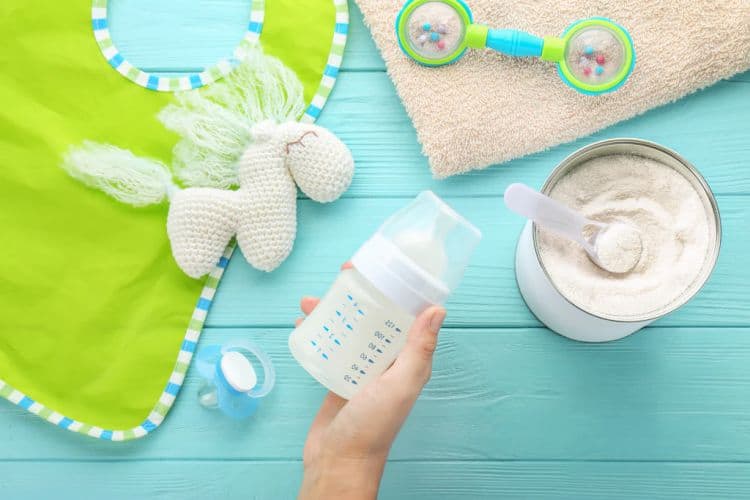HiPP formula is a popular choice for parents who are unable to breastfeed or choose not to breastfeed their babies. HiPP is a German-based company that has been producing organic baby formula for over 60 years. Their formula is made with high-quality, natural ingredients and is free from artificial preservatives, colors, and flavors. HiPP formula is designed to mimic the composition of breastmilk as closely as possible, providing babies with the essential nutrients they need for healthy growth and development. The company offers a range of formulas to meet the specific needs of babies at different stages of development, from birth through toddlerhood.
 Nutritional comparison between HiPP formula and breastmilk
Nutritional comparison between HiPP formula and breastmilk
Breastmilk is widely regarded as the gold standard for infant nutrition, providing babies with a perfect balance of nutrients, antibodies, and other bioactive compounds that support their immune system and overall health. While no formula can fully replicate the complexity of breastmilk, HiPP formula comes close in terms of its nutritional composition. HiPP formula contains a blend of organic cow’s milk, essential fatty acids, vitamins, and minerals to support healthy growth and development. It also contains prebiotics and probiotics to promote a healthy gut microbiome, similar to the beneficial bacteria found in breastmilk. However, breastmilk also contains live antibodies and other immune-boosting factors that cannot be replicated in formula. Additionally, breastmilk changes in composition to meet the evolving needs of a growing baby, something that formula cannot do.
Benefits and drawbacks of using HiPP formula
One of the main benefits of using HiPP formula is its high-quality, organic ingredients. The company is committed to using only the best ingredients in their formulas, which can provide peace of mind for parents who want to ensure their baby is getting the best possible nutrition. HiPP formula is also free from artificial additives and preservatives, making it a healthier choice compared to some other formulas on the market. However, one drawback of using HiPP formula is its cost. Organic formulas tend to be more expensive than conventional formulas, which can put a strain on some families’ budgets. Additionally, some babies may have trouble tolerating certain ingredients in HiPP formula, such as cow’s milk protein or lactose, leading to digestive issues or allergies.
How to choose the right HiPP formula for your baby
When choosing a HiPP formula for your baby, it’s important to consider their specific nutritional needs and any potential allergies or sensitivities they may have. HiPP offers a range of formulas tailored to different stages of development, from birth through toddlerhood. For newborns, HiPP offers a gentle formula that is easy to digest and provides essential nutrients for healthy growth. As babies grow and their nutritional needs change, HiPP offers follow-on formulas with added vitamins and minerals to support their development. If your baby has a cow’s milk protein allergy or lactose intolerance, HiPP also offers special formulas that are free from these ingredients. It’s important to consult with your pediatrician before choosing a formula to ensure it meets your baby’s specific needs.
Tips for successful formula feeding
For parents who choose to formula feed their babies, there are several tips to ensure successful feeding and proper nutrition. It’s important to follow the instructions on the formula packaging carefully to ensure the correct ratio of water to powder is used. Sterilizing bottles and nipples before each use can help prevent bacterial contamination and reduce the risk of infection. It’s also important to hold and cuddle your baby during feeding time to promote bonding and emotional development. Additionally, paying attention to your baby’s hunger cues and feeding them on demand can help establish a healthy feeding routine.
Potential concerns and controversies surrounding HiPP formula
While HiPP formula is generally well-regarded for its high-quality ingredients and commitment to organic farming practices, there have been some concerns and controversies surrounding the company’s products. In 2017, HiPP was involved in a recall of some of its infant formula products due to potential contamination with salmonella. While the company took swift action to address the issue and no illnesses were reported, it raised questions about the safety and quality control measures in place at their production facilities. Additionally, some critics have raised concerns about the environmental impact of organic farming practices used by HiPP, arguing that it may not be as sustainable as it claims.
Is HiPP formula a good substitute to breastmilk?
In conclusion, while breastmilk is widely regarded as the best source of nutrition for babies, HiPP formula can be a good substitute for parents who are unable to breastfeed or choose not to breastfeed. The company’s commitment to using high-quality, organic ingredients and its range of formulas tailored to different stages of development make it a popular choice among parents who want to provide their babies with the best possible nutrition. However, it’s important for parents to carefully consider their baby’s specific nutritional needs and any potential allergies or sensitivities before choosing a formula. Additionally, it’s important to stay informed about any potential concerns or controversies surrounding HiPP formula and to consult with a pediatrician if you have any questions or concerns about your baby’s nutrition. Ultimately, the decision to use formula or breastfeed is a personal one that should be made based on what is best for both the baby and the parent.

